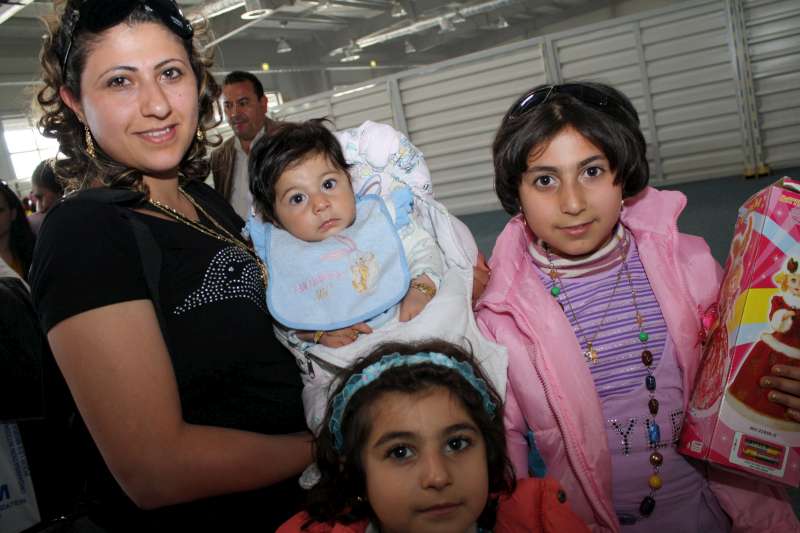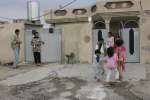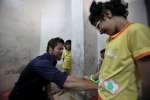- Text size
 |
|  |
|  |
| 
- Français
UNHCR reaches milestone in resettlement of Iraqi refugees
News Stories, 18 June 2010
AL HASSAKEH, Syria, June 18 (UNHCR) – UN High Commissioner for Refugees António Guterres announced on Friday that UNHCR has referred 100,000 Iraqi refugees for resettlement from Middle East countries since 2007.
While hailing the milestone, Guterres said more needed to be done. "A hundred thousand submissions of Iraqi refugees is a tremendous achievement. Many have been living in limbo for years. This will increasingly be the case if states don't continue to welcome Iraqi refugees for resettlement," said Guterres.
He also urged resettlement countries "to facilitate the speedy departure of refugees they have accepted for resettlement."
Of the 100,000 submissions of Iraqi refugees, the number of departures up to May 2010 was around 50 per cent, or 52,173 individuals. In 2007, around 3,500 Iraqis departed for third countries from the region. Lengthy security checks and the time it has taken for state processing mechanisms to be established have led to considerable delays in the departure of refugees to their new homes.
Guterres made the important announcement during an official visit to Syria, where he is meeting refugees and talking to government officials. Later in the day, sitting amid refugees, he also talked direct to Washington, DC, and towns in northern Ecuador and Democratic Republic of the Congo in an hour-long live feed link from Al Hassakeh.
Approximately 45 per cent of Iraqi refugees (43,223 individuals) submitted for resettlement live in Syria.
UNHCR's 2009 Global Trends report, released on Tuesday, highlights the fact that Iraqis are one of the largest refugee groups in the world, with an estimated 1.8 million seeking shelter overseas, primarily in Syria, Jordan, Lebanon, Egypt and Turkey. The Syrian government estimates there are 1 million refugees in the country, the majority from Iraq.
Voluntary repatriation worldwide in 2009 was at its lowest point in 20 years, with around 251,500 returns, of which only 38,000 were Iraqi.
"The growing resilience of conflict results in a larger proportion of refugees who are unable to return to their homes," said Guterres, noting that major conflicts in Afghanistan, southern Sudan and the Democratic Republic of Congo show no signs of being resolved, while "conflicts that we had hoped were on their way to being resolved are stagnating."
The High Commissioner, who is in Syria to join World Refugee Day activities, spent most of the day meeting refugees in Al Hassakeh province and listening to their tales of suffering and hearing their frustrations.
"All I want is to feel secure, and for our country to stabilize so we can end years of exile and return home," Issa, 55, a refugee from Mosul, said as tears rolled down his cheeks. "But with conditions not improving, we cannot go back home," his wife Zahra added.
"I promise you when conditions stabilize in Iraq and the security situation improves, UNHCR will help you return to your homes," the High Commissioner told the family.
Sitting on the floor with members of an Iraqi family that sought refuge in Syria in 2006, Guterres later joined US Secretary of State Hillary Clinton and UNHCR Goodwill Ambassador Angelina Jolie in the global live video event.
He also visited Al-Hol camp, where some 500 Palestinian refugees have been living since fleeing violence and persecution in Iraq. Guterres watched refugee children take part in a traditional Palestinian dance in the sweltering heat of the dry desert area. "Enough exile, enough death," said one child, reciting a poem.
Refugees complained during lunch with the High Commissioner of extremely harsh conditions in the desert. Al Hassakeh has suffered from a drought during the past four years. In addition to the shortage of water, refugees said they could not sleep at night for fear of being bitten by deadly scorpions and poisonous snakes.
Guterres will visit Iraqi refugees living in Damascus on Saturday and Sunday, which is World Refugee Day. He will meet Syrian President Bashar Assad on Sunday and take part in an open day for refugees in Damascus.
By Wafa Amr, Farah Dakhlallah and Dalia al-Ach in Al Hassakeh, Syria






































